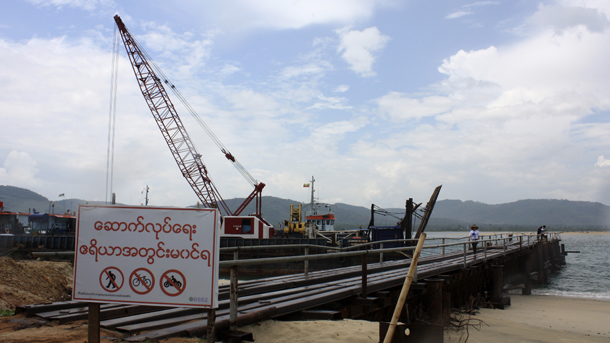RANGOON — Ahead of this week’s Japan-Asean Summit, a Dawei-based NGO has called on Japan to carefully consider its potential involvement in the Dawei Special Economic Zone in southern Burma, as the project will have far-reaching social and environmental impacts.
In an open letter to Japan’s Prime Minister Shinzo Abe, Dawei Development Association (DDA) urged Japan to review these impacts before deciding to become involved in developing the stalled megaproject.
In recent weeks, Italian-Thai Development Co. Ltd. (ITD) was removed from its position as lead project developer after it failed to attract private investors to Thai-Burmese SEZ, which is seen as a boon for Thai economic interests. The project has been suspended and ITD’s work will be subject to a Due Diligence Assessment.
Japan has voiced interest in getting involved in the project and is expected to discuss investment in Dawei SEZ with Thailand at the ASEAN-Japan summit held in Tokyo this week. The Bangkok Post reports that Thailand Deputy Prime Minister Niwatthamrong Bunsongphaisan will ask Shinzo Abe for support and investment in the project.
The massive billion-dollar project includes a deep-sea port, heavy industries and extensive transport links. It would form a regional industrial hub located just 350 km west of Bangkok. Japan’s Mitsubishi Corporation has reportedly agreed to build a massive, 7000-megawatt coal plant at Dawei.
Thousands of Dawei farmers would be required to give up their land for the project, which would also produce high levels of industrial pollution. Local communities are up in arms over these prospects and have complained of a dearth of project information and poor compensation offers for loss of land.
DDA warned Japan over these problems and said any Japanese involvement should meet its international standards on Japanese investment overseas.
“[W]e local people from Dawei in [Tenasserim] Region demand that the Japanese government and relevant agencies carefully and closely consider and review the existing environmental and social impact studies, as well as the human rights violation situation in the Dawei Deep Sea Port and SEZ Projects, before making any decision to participate in these projects,” the letter said.
Ye Lin Myint, from DDA, told The Irrawaddy, “Japan is interested to invest. Myanmar and Thai governments also want Japan to invest. We also want Japan to invest as Japan has the experience and financial resources to handle this kind of huge project.
“But we want them to head the project and solve the current problems relating to land compensation, environmental impact, resettlement and creating livelihood opportunities for locals.”
“Even if the project can’t avoid damage to land, we need to find international standards and practices to ensure the least damage to the environment and social and health conditions,” said Ye Linn Myint, adding that he believed there was no need to construct the massive coal plant.
“We have enough natural gas from Yetagon, Yatanar and Zawtiga [gas fields] for the project, as the government has promised that newly-found natural gas will be used for public benefit,” he said.
Burma’s government has cancelled the planned construction of 4000-MW coal-fired power plant in Dawei in January 2012 due to concerns over its environmental impacts.
Earlier this year, DDA filed a complaint with Thailand’s National Human Right Commission over inadequate land compensation by ITD and the company’s supposed involvement in human rights and community rights violations.

















